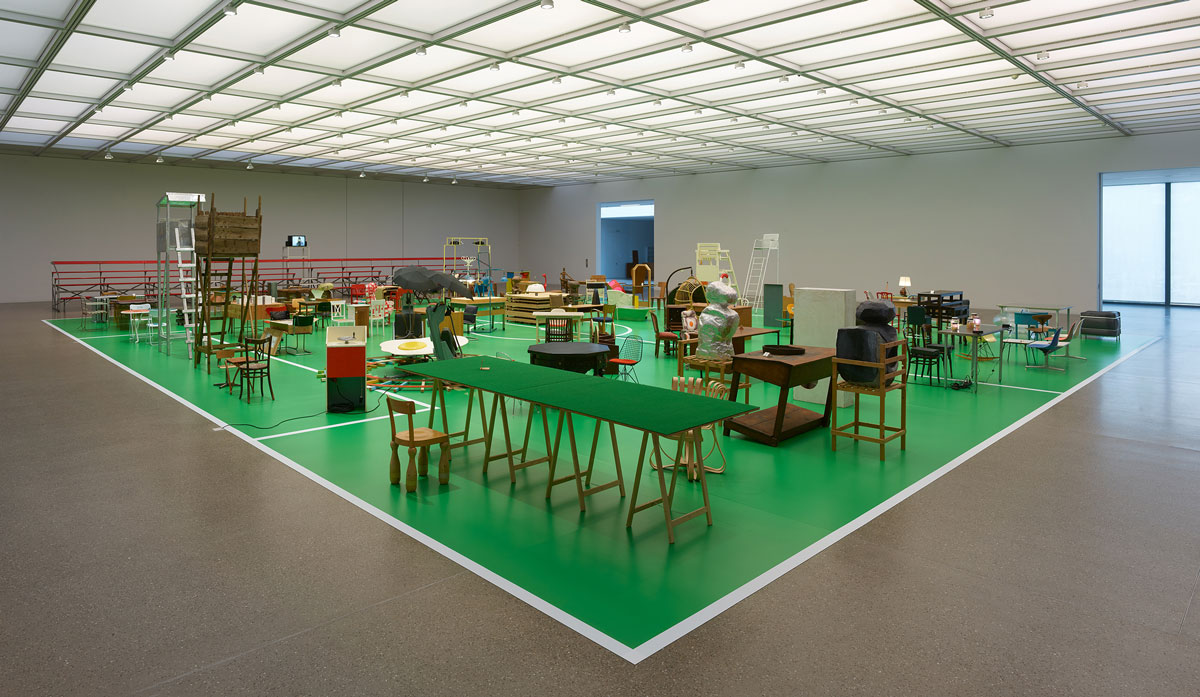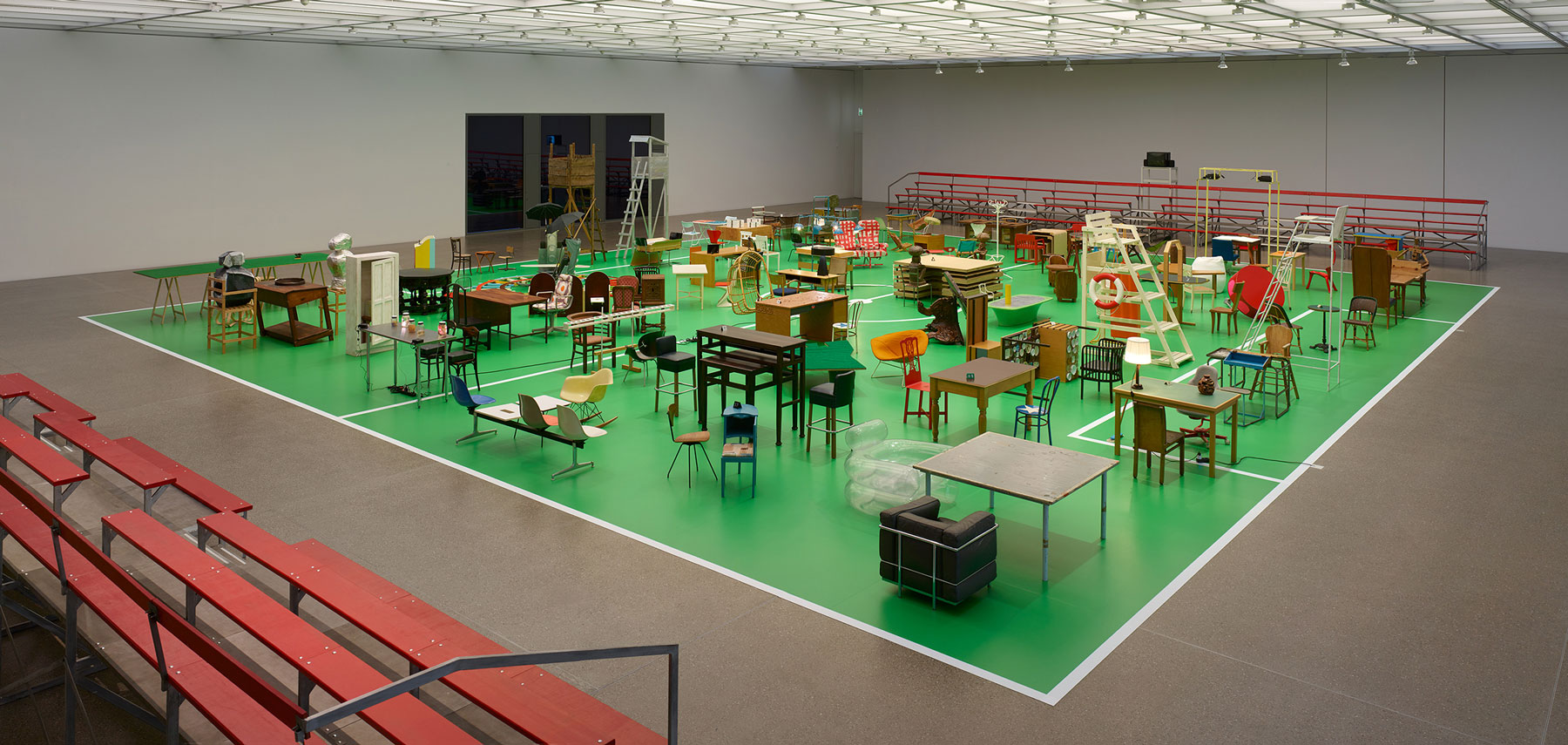ART-PRESENTATION: Martin Kippenberger-The Happy End of Franz Kafka’s “Amerika”
 Martin Kippenberger made paintings, sculpture and installations which offer a humorous yet bitter commentary on the modern world and the artists place in it. Only in recent years, after his premature death, is Kippenberger’s extraordinary and influential work becoming internationally recognized. Kippenberger’s artistic career (based in his native Germany but encompassing such far-flung locations as Florence, Madrid, Vienna, New York, Los Angeles, Rio de Janeiro, Syros, and the Yukon) was a twenty-year commitment to unrestrained excess. It began in the late 1970s, at a moment when the greatness of modern art seemed suddenly distant—a century-long celebration whose door was now closed to newcomers.
Martin Kippenberger made paintings, sculpture and installations which offer a humorous yet bitter commentary on the modern world and the artists place in it. Only in recent years, after his premature death, is Kippenberger’s extraordinary and influential work becoming internationally recognized. Kippenberger’s artistic career (based in his native Germany but encompassing such far-flung locations as Florence, Madrid, Vienna, New York, Los Angeles, Rio de Janeiro, Syros, and the Yukon) was a twenty-year commitment to unrestrained excess. It began in the late 1970s, at a moment when the greatness of modern art seemed suddenly distant—a century-long celebration whose door was now closed to newcomers.
By Dimitris Lempesis
Photo: Museum Folkwang Archive
At the time of his death in 1997, Martin Kippenberger was the leading German artist of his generation. Unlike a previous generation of artists who, under influence of Joseph Bueys, viewed the artist as a shamanistic savior of sorts, Kippenberger’s generation viewed the artist as a symptom of the cyclic regression from capitalism to fascism and back again. With respect to the role of the artist as the guardian of utopian or transcendental longings, Kippenberger was neither a pessimist nor an optimist but an existentialist in the truest sense. Martin Kippenberger’s Magnus Opus “The Happy End of Franz Kafka’s ‘Amerika’” 1994), is on display in Museum Folkwang’s large exhibition hall in the impressive dimensions of its “original version”. The work reimagines a scene towards the end of Kafka’s unfinished 1927 novel. The installation re-imagines a section of the book when the protagonist Karl Rossmann, having travelled across America, applies for a job at the “biggest theatre in the world”. “Everybody is welcome!” proclaims the call for employment, “Whoever wants to become an artist should sign up!”. Kafka never completed the novel, which he abandoned writing over ten years before it was posthumously published in 1927, and Kippenberger claimed that he never finished reading it, hearing the story second-hand from a friend. The unfinished condition of the book leaves open the possibility, unusual in Kafka’s fiction, for a happy ending. “The Happy End of Franz Kafka’s ‘Amerika’” explores the fictional utopia of universal employment, adapting Kafka’s idea of communal job interviews into an artwork. Kippenberger described the situation depicted in his installation as ‘a circus in town, looking to employ reliable hands, helpers, doers, self-confident handlers and the like. Outside the circus tent, in my imagination, there would be tables and chairs set up for job interviews’. The installation consists of a diverse assortment of objects and furniture, assembled to suggest a playing field for conducting mass interviews. “The Happy End of Franz Kafka’s ‘Amerika’” Kippenberger’s most complex work, presenting the viewer with an overabundance of possible meanings. At one level, the installation refers to the competition between artists and constant judgements within the art community. Yet the variety of furniture also suggests a range of personalities and psychological types, and the interview format reflects the artist’s belief in the fundamental importance of relationships and dialogues. Using 50 table-and-chair ensembles, comprising readymades, found objects, specific fabrications, and artworks by Kippenberger and numerous artist friends, he projects a Kafkaesque communication zone onto a stylised, 20 x 23 m football field. Among designer furniture, home-made constructions and sculptural objects, high chairs and ejector seats, there is room for an equally large number of job-interview situations: the symbolic points in a life, his (artistic) life, emblematic of verbal communication and the constant struggle for recognition. Between permanent revolt and incisive social analysis, the work unfolds Kippenberger’s aesthetic cosmos as an exhibition and confronts the spectator with social questions about the mechanisms of career success, integration, repression and power.
Photo: Martin Kippenberger, The Happy End of Franz Kafka’s ’Amerika’, 1994, Installation view, Museum Folkwang-Essen, 2021, © Estate of Martin Kippenberger, Galerie Gisela Capitain-Cologne Photo: Simon Vogel
Info: Museum Folkwang, Museumsplatz 1, Essen, Duration: 7/2-16/5/2021, Days & Hours: Tue-Wed & Sat-Sun 10:00-18:00, Thu-Fri 10:00-20:00, www.museum-folkwang.de








